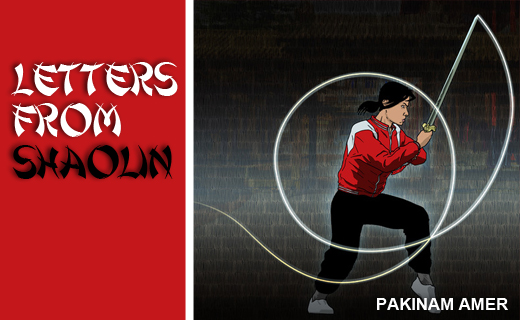Falling in Love with Ignorance
Cut off from the modern world, Pakinam Amer wonders if ignorance truly is bliss or, in her case, Zen.

“People here are so ignorant of the outside world. They really don’t know anything about the rest of the world, and it doesn’t look like they want to,” declared John. The Sanshou American student who used to live on the foreign camp’s dorms in Shaolin Si Xiaolong Wuyuan, my boarding Kung Fu school, near the Shaolin Temple. At the time, were discussing how “different and unplugged” the Chinese living in Dengfeng are.
Dengfeng, part of Henan province, a town that sprung around the temple and ever since has been swarming with Kung Fu students, masters and monks, is deep in the heart of mainland China – raw and unmodernized.
“You know what John?,” I responded at the time, more than three months back. “If I hadn’t been here and if you’d told me that exact same phrase back in Egypt, I would’ve thought you’re just another arrogant, judgmental American, but now, I agree. It’s just shocking how little information they have about anything beyond this area,” I said.
In addition to being unprivileged when it comes to education, knowledge of other cultures and technology, small differences in habits often surprise them. For instance, Chinese in this area drink hot water, believing it’s healthier. I tried to probe to know the wisdom behind that, but none was given. I asked Chris “Luka,” the Aussie being the savvy student among us, and he responded laughingly, “There probably isn’t any wisdom. Some guy said it a thousand years ago, so they do it.”
A day later, during break, I was summoned by several Shifus (“Shifu” means master and father, and it is used as a respectful title to address one’s Kung Fu teacher). They wanted to chat. As is the case with almost everyone here, they barely knew any English, so my Shifu Li Yong Hui, acted as the translator. They asked where I’m from, and I said, “Egypt.” And all they knew about the country was the fact that it has pyramids and “black people.”
They asked about my job, and I explained that “I write in a newspaper,” gesturing with my hands, and they looked impressed. They don’t get newspapers in the school, but some places sell them in town. They asked if Egypt had any Kung Fu schools. I said it probably has a few, but added that we have Karate schools, abundantly. My Shifu nodded murmuring, “ah, Japanese Kung Fu.” That’s how they know it here.
I was the first Egyptian they meet. And at that moment, I felt I was the teacher, as we sat cross-legged in a tight circle, and they listened attentively.
During the interjections of silence, I could hear the echo of hundreds of battle cries, sword clanking, and whip cracking as thousands of Kung Fu students trained across the school. Even during breaks, the performing monks and some advanced students persisted in training.
Momentarily, I felt I was in a different era; transported back in time several decades.

One Shifu said he was surprised my skin is not darker, adding amusedly that I’m the same color as them, but that my features look more like the “Chinese living in the North.” I responded by saying that “Egyptians come in all colors.” That drew some smiles. Others also asked if we “cultivate rice in Egypt.” I said we do, not understanding why that piece of information would be significant to anyone.
Secretly, I thought to myself, perhaps they actually think I live in a pyramid. But somehow, this notion didn’t in the least bit offend me. And I didn’t bother to try and correct it or explain that Egypt is very modern in comparison to Dengfeng.
I don’t even know if that’s a plus.
Despite the ruggedness and the simplicity of life here, it still has a special something that distinguishes it from a big city, despite the multitude of services and comforts the latter provides.
Mind you, life here is rugged, especially on Xiaolong camp. John, Chris and I joked once that some prison facilities in the West might be friendlier, comfier and cleaner than most of the sleeping and dinning halls here.
But its invisible edge ––the magical touch this place has–– could very well be due to the fact that it feels stranded, amid sky-high green mountains, suspended in time, and unconcerned with the burdens the rest of the world carries. Perhaps it’s the fact that life revolves around small things: training, eating, exchanging some harmless, humorous gossip, enjoying a good hot shower or a sound sleep.
It’s true that people here are in a strange kind of bubble, separated from our very connected world — bustling with broadcasts, chatter and virtual images, and the buzz of millions interacting via the Internet, phones, cinema, art, politics or what have you. And it does seem like ––excuse my bluntness–– people here are, well, ignorant.
But really, do they need to know what we know or have what we have in order to be “cultured” or “knowledgeable”?
And has knowledge brought us happiness, or peace of mind?
Here they are, living a bare life, but managing to laugh loudly, speak with passion, bend their legs and arms in every direction, kick and punch with gusto and no anger, sleep like babies and wake at sunrise. And back there, in the now-modern lands of the pyramids or in other big cities, I’ve seen people leading much more sophisticated lives, blessed with superior learning, yet struggling with insomnia, anxiety, drenched in worries; their minds going in loops, and slowly driving them crazy.
I asked Shifu Li if he ever thought of leaving, going to America or the Middle East to teach Kung Fu there. He said he’d been to Germany, France, and other countries in Europe as part of delegations and international Shaolin shows. But “I always like to come back here.”
I don’t want to overly romanticise it. But may be — just may be — it’s OK to be protected from the modern world and its deep pockets of knowledge. May be “our knowledge” is the rabbit hole we all fell into, got too fascinated with (and a little mad) that we became disconnected from the reality that life, after all, boils down to very simple things; if you can sleep well, wake up with a clear head, if the sun’s warmth can make you smile, you’re probably in zen.
And no amount of world education compares to that.
- Previous Article I Got Banged!
- Next Article Ana A3ed 3alkanaba.com
























